Module Introduction
Purpose in Context
Parenthood can be full of joyful and peaceful moments as well as challenging ones., Research suggests that having a greater sense of purpose is an important ingredient for resiliency—purposeful people are happier, have better health and cognitive functioning, and live longer. As parenting practitioners, we have the unique opportunity to help parents reflect on the aspects of parenting that provide them with a sense of purpose and support them in guiding their older children explore interests and aspects of their identity that could fuel their own sense of purpose. This work may, in turn, help practitioners foster their own sense of purpose.
Individual Exploration
What is Purpose?
To psychologists, purpose is an abiding intention to achieve a long-term goal that is both personally meaningful and makes a positive mark on the world, potentially changing the lives of others. Examples include launching an organization, researching a disease, or raising children. Many parenting practitioners feel a deep sense of purpose from their work with parents and children.
It’s important for practitioners and parents to know that purpose is not a destination, but a journey and a practice. That means it’s accessible at any age if we’re willing to explore what matters to us and what kind of person we want to be—and act to become that person. It also means that our sense of purpose changes over the course of our lifetime; research finds that it will naturally wax and wane. This research suggests that if we’re able to revisit and renew our sense of purpose as we navigate milestones and transitions, then we can look forward to more satisfying, meaningful lives.
Purpose in Childhood
Our paths to finding purpose can be shaped by early childhood experiences. Studies have found that people who experienced greater adversity and conflict with their mothers as children tend to have less of a sense of purpose as adults, whereas those who had stronger memories of the beauty of nature from early childhood and more secure attachments to their parents tend to have a greater sense of purpose as adults.
While early life may set the stage for finding a purpose, the process really begins when we’re teens, as we explore who we are, what we value, and what we want out of life, says purpose expert Kendall Cotton Bronk, professor at Claremont Graduate University. Some teens start to discover the paths they want to pursue by trying different interests and activities, like music or volunteering. Other teens have challenging life experiences, like a parent being diagnosed with cancer or a shooting in their hometown, that spur them to work on particular causes. Others are inspired by parent and coach role models leading purposeful lives.
In The Path to Purpose, researcher William Damon shares insights from decades of studying how individuals cultivate purpose in their professional endeavors, family relationships, and civic engagements. As he describes it, purpose is like a chemical reaction that takes place when our skills meet the needs of the world. Parents can guide young people to identify something in their environment that could be improved, whether it’s politics or modern jazz music, and recognize something in themselves that they can bring to bear on that problem—leadership skills or creativity, for example.
According to Damon’s research, only about one in five teens has a strong sense of purpose. Others have pie-in-the-sky dreams or fun hobbies, or they’re just trying to get through high school. More often, childhood and adolescence seem to be when the building blocks of purpose are established, but we’re still exploring what we want out of life.
The teen years are also important for identity development, and research shows that developing purpose and identity are intertwined processes. A study of high school and college students found that those who had a more solid sense of identity—clear ideas about the jobs, values, friendships, politics, religion, and gender roles they would have in life—also had a greater sense of purpose. A later study by the same researchers had a similar finding, but in the opposite direction: young people who felt more purposeful built a more solid sense of identity over time.
Discovering a sense of purpose may help teens overcome difficult situations. A study by Bronk and her colleagues found that Greek adolescents with greater purpose were both more resilient and optimistic during the Great Recession. They could better adapt when they faced setbacks and believed things would improve. In turn, particularly thanks to their resilience, they were also more likely to have brighter expectations. These purposeful youth didn’t ignore or downplay the economic challenges—their beliefs and knowledge about the state of the economy weren’t any different—but they did see hope and opportunities for themselves. “[Helping youth find a purpose] is likely to benefit not only the young people, but also the families, communities, and even countries to which these young people may choose to contribute,” explains Bronk and her colleagues.
Research shows that mentorship is an important part of the process of discovering a sense of purpose, as children often need inspiration. Adults can support children in identifying how to best use their talents and provide encouragement to motivate them to move forward with their commitments. As children make greater commitments and identify how to use their talents to have a positive impact on others, they will begin to develop a sense of purpose.
Listen to Kendall Cotton Bronk speak about how children and teens develop a sense of purpose.
Purpose in Parenthood
Many parents feel a deep sense of purpose from becoming parents and raising their children. The transition to parenthood can become a time when parents explore a new aspect of their identity, which can spur new meaning to their lives. What’s more, raising children can change a parent’s perspective and promote new long-term goals themselves, their children, and the world they want to create for their children in the future.
Parents may also find a sense of purpose at work, where they feel fulfilled in supporting their coworkers, making a difference in the organization, or contributing to society, writes Damon. Volunteering and engaging in civic life can be sources of purpose for parents, and can be especially meaningful and fulfilling when they do so with their children.
Having a sense of purpose can help parents sustain their energy and be persistent when times are tough. A study of mothers with opioid use disorder found that their infants provided them with a sense of purpose and resilience during their road to recovery. In another study, low-income mothers with a stronger sense of purpose experienced more positive psychological growth following Hurricane Katrina.
Fostering a sense of purpose may also make parents healthier. According to one study, mothers who have a stronger sense of purpose are less likely to smoke. Another study found that fathers had a greater sense of purpose than non-fathers and that men with a greater sense of purpose engaged in healthier behaviors such as eating well and exercising. These findings suggest that parenthood provides some parents with a sense of purpose that can motivate them to take better care of themselves.
There are ways that parents can develop a greater sense of purpose. In a recent study, fathers learned about research on how children benefit when dads are involved and then were asked to reflect on and write about their sense of purpose as a father. For example, these reflections could involve prompts like the ones below, which were adapted from the study:
- Think about the type of life you want your child to have. What long-term goals and aspirations do you have for them? (For example, do well in school, and be healthy.)
- Think about a recent positive experience you had as a parent with your child. Briefly describe it then identify two or three of your core values it reflects. (For example, going to the playground represents my value of fun, connection, and growth.)
- What are two or three specific character strengths you bring to being a parent? (For example, hard work, compassion, or loyalty.)
- What are two or three specific skills you are motivated to develop as a parent? (For example, better communication, empathy and listening, and organizational skills.)
- Now, take a moment to reflect on your unique combination of core values, character strengths, and skills you are motivated to develop and the long-term goals and aspirations you have for your child. Finish your reflection by writing about the impact you want to make on your child’s life or in the world through your role as a parent.
Compared to fathers who didn’t engage in learning and reflection, fathers who participated in the writing program grew in their sense of purpose. The findings suggest that taking time to think about fatherhood helped to nurture a sense that their lives had meaning and an impact beyond themselves. This research highlights how parents can benefit from having time and space to reflect on what it means to be a parent.
“Whether it be brief online reflection exercises or conversations with a trusted health care practitioner, helping new fathers to recognize what they find meaningful about fatherhood, their hopes and goals for their children, and how they as fathers hope to impact them—such interventions represent a promising way to support fathers and their children’s healthy development,” explain the study’s authors.
Listen to William Damon speak about purpose across the lifespan.
Nurturing Purpose
According to research by Kendall Cotton Bronk, finding one’s purpose requires four key components: dedicated commitment, personal meaningfulness, goal-directedness, and a vision larger than oneself.
Finding our purpose often involves combining meaning-making in past experiences with assessing our values, skills, and hopes for a better world. It means taking time for personal reflection while imagining our ideal future. Remember, you can nurture a sense of purpose in small steps.
Here are some activities purpose researchers recommend for finding a sense of purpose in life:
- The Magic Wand: Think about the world around you — your home, community, the world at large—and visualize what you would change if you had a magic wand and could change anything. Ask yourself why you chose what you did and consider concrete steps you might take to move the world a little closer to that ideal. This exercise has been used to foster purpose in youth and young adults.
- Best Possible Self: Imagine yourself at some future age — like 10 or 20 years down the road—and think about your life if everything went as well as possible. Then ask yourself these questions: What are you doing? What is important to you? What do you care about, and why? Focusing on an ideal self can increase optimism for the future, which researchers believe is tied to purpose.
- Clarify your values: If it’s hard to figure out what matters most to you, affirming your values can help. Three values surveys—the Valued Living Questionnaire, the Portrait Values Questionnaire, and the Personal Values Questionnaire—ask you to rank the importance of different values, which can help you get clearer about your purpose.
- Recognize your strengths: Try the VIA Character Strengths Survey to see what it reveals about you to get a handle on your particular skills. Or, you can contact people who know you—teachers, friends, family, colleagues, and mentors—and ask them what you’re good at, what you seem to like to do, and how you might make your mark on the world. Sometimes an outsider’s opinion can help clarify your personal strengths and help you figure out how best to apply them.
- Tell your story: Those who see meaning and purpose in their lives can tell a story of change and growth, where they overcame obstacles. Creating a narrative can help us see our strengths and how applying those strengths can make a difference in the world.
- Volunteer: Finding purpose is aided by having a broad set of meaningful experiences that can point you in the right direction. Volunteering expands your experience while also improving your well-being and helping the world. Not only that, volunteering puts you in touch with people with similar values, who may inspire you or point you toward other opportunities for making a difference you hadn’t thought of before.
- Read: Reading may be particularly useful for young people looking for purpose. For some teens, reading religious texts or poetry and fiction can help nurture a sense of purpose. By seeing purpose in the lives of other people, teens are more likely to see it in their own lives.
- Cultivate positive emotions: Positive emotions help us to broaden our outlook on the world and feel energized to take action for the greater good, so they can be useful for finding purpose. Gratitude and awe, in particular, help us care about others, build relationships, and feel connected to something greater than ourselves, which is why they’re tied to fostering purpose.
Reflecting on Purpose
Take a moment to reflect on the role that purpose plays in your life before you bring the learning in this chapter to the parents you work with.
- Read the list of statements below and ask yourself these questions:
- How much do you agree or disagree with each of the statements?
- Do your responses reveal opportunities for developing a greater sense of purpose?
- What insights do these statements offer about your current understanding of your life’s purpose?
- Reread the statements as you seek to understand the presence or absence of purpose among the parents you support professionally.
- How much do you think the parents you work with agree or disagree with each statement?
- What could the community provide to help parents foster a sense of purpose?
- What experiences of purpose have parents shared with you that could guide other parents looking to foster a greater sense of purpose in themselves or their children?
- I know how to use my talents to contribute meaningfully to the larger world.
- How clearly do you understand what it is that makes your life feel worthwhile?
- How well can you describe your purpose?
- How often do you hope to leave the world better than you found it?
- How much effort are you putting into making your goals a reality?
Practices to Foster a Sense of Purpose
Now that you have been introduced to this topic, you can explore practices to foster a sense of purpose. The first is a “Practitioner and Parent Practice.” Use it to nurture your well-being. Next, share the same practice with parents to guide them in fostering their well-being. The second is “Parent-Child Practices,” which you can share with parents. They are activities for parents and children to explore their sense of purpose.
Practitioner and Parent Practice
First, try this step-by-step activity for yourself and then guide the parents you support through the practice. During and after the activity, take a moment to pause and notice your thoughts, sensations, and feelings. Guide the parents you work with in doing the same.
Life Crafting: Sharpen your sense of purpose by defining and committing to your goals.
Parent-Child Practices
You can guide parents on these step-by-step activities to support purpose. During and after the parenting activity, encourage the parents to pause to notice their thoughts, sensations, and feelings.
Discoveries, Wonderings, and Commitments
- Discoveries
- What three to five crucial takeaways about purpose are most relevant for you personally and professionally?
- How much of a challenge is a lack of purpose in your community?
- Wonderings
- How might parents in your community respond to the practices to foster a sense of purpose?
- What kinds of modifications to the purpose practices would you consider making to meet the specific needs of the parents in your community?
- Commitments
- What actions do you intend to take based on your learnings about purpose for yourself? For the parents you work with?
- Which purpose practice will you share with the parents you work with? What will you say and do to guide them to try this practice?
Additional Purpose Resources
- Video: How Your Conversations Can Help Kids Discover Their Purpose
- Article: Five Ways to Foster Purpose in Adolescents
- Article: How to Find Your Purpose in Life
- Practice: Reflect on Your Purpose as a Parent
Module Resources
This workbook offers parenting practitioners practical lessons and activities to help the reader prioritize cultivating your social and emotional well-being while additionally supporting you in sharing these insights and practices with the parents and families you serve. This workbook includes a chapter on purpose as well as chapters on foundational topics like cultural humility, coparenting, healing and resilience and more.
Sharpen your sense of purpose by defining and committing to your goals.
Group Facilitation
Before facilitating parent groups, spend time in individual exploration in order to experience and embody the learning. In this tab, you will find:
- A chapter with resources for engaging parents and facilitating parent gatherings. (Chapter from GGSC’s Family Well-Being for the Greater Good: A science based workbook for people who support parents)
- A turnkey revisable slide deck designed to support you in facilitating a parent gathering about cultivating purpose.
- A printable handout for parents to take home that includes information about the importance of purpose for parents and children as well as activities to purpose.
Module Resources
This chapter provides support for planning and facilitating parent gatherings. It includes information on building community, reducing barriers to participation, creating welcoming environments, group agreements, and more.
This slide deck is a tool that you can edit and use to share resources on cultivating purpose at an upcoming parent night. If you prefer working in Google Slides, you can download a copy of this Google Slide deck to edit: https://bit.ly/4dI4BAA
This handout can be printed and shared with parents. In addition to introducing parents the benefits of cultivating purpose, this handout includes links to resources on cultivating purpose for parents and for children.

Do you want to dive deeper into the science behind our GGIE practices? Enroll in one of our online courses for educators!



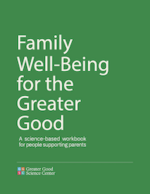
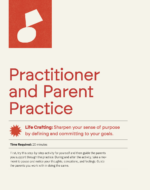
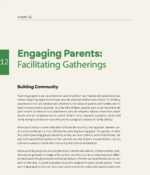
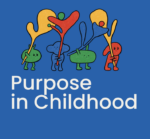
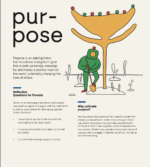
Comments